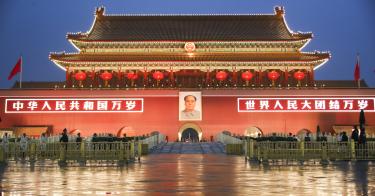A certain fatalism has crept into some corners of Western thought: the notion that a rising China is destined to become the most dominant power on earth; there is nothing America can do to prevent that, and the best we can hope for is to “manage the decline” into also-ran status.
This is a view heartily endorsed by Chinese president Xi Jinping. In a speech earlier this year celebrating the centennial anniversary of the Chinese Communist Party, Xi boasted of how the party had “transformed the future of the Chinese people and nation.” Now, “China’s national rejuvenation has become a historical inevitability,” he said.
For all of Xi’s chest-thumping, however, China is not invincible, nor is its path to dominance foreordained. Indeed, one could just as easily argue that China is fast approaching an era of economic and demographic decline, and Xi’s regime has no idea how to manage its coming.
With a clear-eyed recognition of the threat and a coordinated response with allies and partners, the United States can shape the collapse of China just as it did the Soviet Union.
>>> Assessing Beijing’s Power: A Blueprint for the U.S. Response to China over the Next Decades
Xi sees himself as a revolutionary leader fit to join Chairman Mao and Deng Xiaoping in the Chinese pantheon. To seal the deal, he feels he must dethrone the United States as the world’s most powerful nation. And he’s trying to go about it the old-fashioned way.
Xi’s foreign policy follows the ancient path: it seeks to extort tribute from its neighbors in the Pacific. Like Mao, the more radical Xi has become, the more geopolitical chances he is willing to take. During the Cultural Revolution, Mao picked fights with India, launched border incursions against the Soviet Union and opened the military supply spigot to North Vietnam. Xi has launched military operations against India, attempted to intimidate Taiwan, Vietnam, and the Philippines threatened Japan with nuclear incineration and raised rhetorical and economic threats against Western Europe and Australia.
America has been here before. On February 22, 1946, George Kennan, then a young American diplomat in the Soviet Union, penned a secret cable to the State Department. Kennan warned that Moscow was bent on destroying the United States by first weakening her allies through subversion, bribery, and intimidation and then achieving total military superiority. This clear-eyed assessment, known to history as The Long Telegram, became the foundation for forty-five years of the containment of Moscow and the eventual triumph of the American ideal.
This is 2021, not 1946, but replace Moscow with Beijing and the Long Telegram once again rings true. As Kennan would have opined, China, “is undoubtedly the greatest task our diplomacy has ever faced and probably the greatest it will ever have to face.”
Today, Xi is using foreign adventurism and military modernization to distract from massive problems at home. The population is rapidly ageing. The Communist Party has laid environmental waste to vast swaths of the mainland. China must import its energy. And as evidenced by the crushing of the democratic movement in Hong Kong, the Chinese people are growing restless under the increasing repressiveness of the state. Former Secretary of Defense Robert Gates points out, China’s leaders are “deathly afraid of their own people.”
China is surrounded by nations with thousand-year memories of Chinese aggression and imperialism. American support to strengthen nations like Japan, Vietnam, India, Korea, Australia, Singapore, New Zealand, Malaysia, and the Philippines would weaken Beijing.
In the Pacific region, the focus must be on America bolstering the sovereignty of its partners. The United States must increase air space and maritime operations and make China think first about its home waters. The U.S. Navy still has a qualitative advantage, but China is now the world’s top shipbuilding nation. America has fewer than ten shipyards. If it does not act, then the sheer quantity will begin to tip the maritime balance. The same applies to air and space forces.
Washington must also make it easier for its partners to share and obtain the military capabilities they require. Today, ancient Cold War guardrails make it difficult for allies like Japan and Australia to take advantage of American power and technology. The United States can enhance missile and civil defense throughout Asia. There is no reason why America cannot expand Boris Johnson’s D-10 formula to add Asian powers to the G-7 and formerly anchor western Europe in the Indo-Pacific. Containing China is a global task.
Western opinion has been moving against Beijing, and the coronavirus disaster has accelerated the trend. Businesses in the United States and Europe are slowly beginning to think again about doing business with the Middle Kingdom. China has now been added to NATO’s agenda.
>>> Pentagon’s China Military Power Report Confirms Beijing’s Nuclear Ambitions
America controls the world’s reserve currency—leverage the Biden administration does not understand we have. Primary and secondary sanctions on Chinese businesses that are violating international and commercial law (including buttressing such bad actors as Iran and North Korea) would devastate Beijing’s dark economy.
We have the tools to win the long game, but this requires patience and overcoming an American aversion to looking no further than tomorrow’s headlines. Also, it means telling the American people the truth that China is not a competitor; it is an enemy.
The containment strategy to hold the Soviet Union in check lasted from Harry Truman to George H. W. Bush. We don’t have any idea how long containment of China might take, but Xi’s arrogance and financial insanity may give the West a strategic opening to charge through and help the Chinese Communist Party follow the Soviet Union’s path to oblivion.
This piece originally appeared in The National Interest https://nationalinterest.org/feature/united-states-can-shape-china%E2%80%99s-collapse-195898



